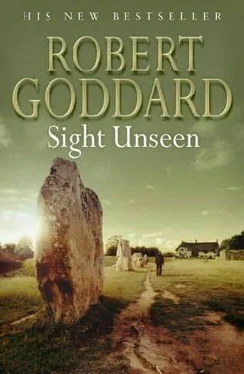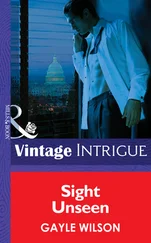* * *
Umber was happy to wait. He needed a few minutes alone to settle in his mind the limits of what he could or should tell Philip Griffin. He had learnt nothing so far that amounted to the proof he needed of Marilyn's complicity in Henry Griffin's murder. And the crackpot details of the Griffins' claim to the throne, however entertaining, were unlikely to supply it.
* * *
Close to ten minutes passed, during which the sounds of drawers being opened and closed in an upper room reached Umber's ears intermittently. Then Griffin returned, clutching a stapled sheaf of papers.
'There was a lot of Henry's stuff left here when Father died. I chucked most of it out. But I kept this, if only because it's as handy an account of the family legend as you could ask for. As you'll see, Henry hoped to get it published. But it wasn't to be.' He passed the papers to Umber. 'Take your time. I'll make some tea.'
So, almost immediately, Umber was alone again. He looked at the papers in his hand. The top sheet was a letter to Henry from the editor of History Today, dated 16 April 1980. It was a rejection letter for an article Henry had submitted, entitled Junius, the Royal Family and the Griffins of Kew. The editor described the piece as 'diverting', but crushingly added, ' I am sorry to say that you provide no supporting evidence for any of your extraordinary assertions.' He returned the article therewith. And it was still attached, typed out by Henry on double spaced, generously margined pages. The poor chap could not be faulted for presentation, however unsubstantiated the contents. Umber settled down to read it.
My family has lived in Kew for nearly two hundred years. Strangely, the founder of our family was a man none of us is related to. This man, Frederick Lewis Griffin, is historically very important, though history has nothing to say about him. The time has come to put that right.
Frederick Griffin was born in Covent Garden, London, on 29 June 1732. He was an illegitimate son of Frederick, Prince of Wales, by the actress Sarah Webster. His mother gave him the surname Griffin because the Prince had been known in his childhood in Hanover as 'Der Grief – the Griffin, a beast he was supposed to resemble.
By the time of the boy's birth, Sarah Webster had already been supplanted as the Prince's mistress, but the Prince paid her a generous allowance for his son's upbringing. He continued to do so after his marriage to Princess Augusta of Saxe-Gotha in 1736. When Sarah Webster died, in 1740, the Prince arranged for his friend the Earl of Chesterfield to look after the boy, who was given an excellent education.
Frederick Griffin was an undergraduate at Oxford when the Prince died suddenly on 20 March 1751, aged 44. Some said his death was caused by the after-effects of a blow from a cricket ball. Others said he had caught a fatal chill while working in his beloved gardens at Kew in wet weather. Still others whispered that he had been poisoned by his wife because he had discovered her long-standing affair with his Lord of the Bedchamber, the Earl of Bute.
Princess Augusta immediately cancelled the allowance paid to Frederick Griffin, who was forced to leave Oxford. Lord Chesterfield obtained a position for him in the East India Company and he spent the next ten or twelve years in India. He returned to England at some point in the mid-1760s a moderately wealthy man. He bought a small house at Strand-under-Green (now Strand-on-the-Green) on the north bank of the Thames, opposite Kew, and lived there for the rest of his life.
It has always been believed in my family that he chose to live at Strand-under-Green because of its proximity to the royal residences of Kew Palace and Richmond Lodge. He had heard the rumour that Princess Augusta had murdered his father. He had heard another rumour concerning his half-brother, King George III, who had succeeded to the throne in 1760. This was that George, while still Prince of Wales, had secretly married Hannah Lightfoot, a Quaker, and had a son by her, known as George Rex. Once on the throne, George had put Hannah aside and contracted a politically more expedient though technically bigamous marriage to Princess Charlotte Sophia of Mecklenburg-Strelitz.
Frederick Griffin was appalled by such conduct and the deleterious effect he believed it to be having on the moral fibre of the nation. Thus he began his letter-writing campaign under the name of Junius, protesting at corruption in the high offices of government. Princess Augusta, the 'odious hypocrite', as Junius called her, came in for particularly harsh criticism. The King, a 'consummate hypocrite', fared little better. The letters appeared in the pages of the Public Advertiser for a little over three years. They came to an abrupt end early in 1772, when Princess Augusta's death deprived Junius of his principal target.
Frederick Griffin lived on at Strand-under-Green and at some point befriended the young George Rex. Very little seems to be widely known of the life of George Rex prior to the year 1797, when he was appointed Notary Public to the Governor of Cape Colony in South Africa. This lucrative appointment was subject to two unusual conditions: firstly that he should never return to England; secondly that he should never marry. The intention was obviously to ensure that his legally irrefutable claim to the throne died with him. He abided by these conditions to the extent that he remained in South Africa until his death in 1839 and left no legitimate issue there.
We must now move forward to the famous theft of the parish records from the robing room of St Anne's Church, Kew, during the night of 22/23 February 1845. This has never been satisfactorily explained, although it has often been alleged that the Royal Family required the removal of the record of a marriage or baptism which they found embarrassing. George Ill's marriage to Hannah Lightfoot and the birth of George Rex predate the records stolen (marriages after 1783, burials after 1785, baptisms after 1791) by many years and cannot have been the reason.
It has always been believed in my family that the theft was actually organized at the behest of Prince Albert to nullify a potential threat to the legitimacy of Queen Victoria's claim to the throne. The threat was posed by the fact that George Rex married a local woman called Mary Ann Leavers at St Anne's Church on 30 December 1796. Frederick Griffin was one of the witnesses. The officiating priest was Dr James Wilmot, who had also officiated at George Ill's marriage to Hannah Lightfoot more than thirty years previously.
When George Rex's marriage became known to the King, he took steps to have the couple separated and banished his son to South Africa. What George Rex did not know when he took ship for Capetown in the summer of 1797, however, was that his wife was pregnant. A son, John, was born on 3 January 1798. His mother did not survive the birth. Honouring a promise given to her with such an eventuality in mind, Frederick Griffin became the boy's guardian and sought to protect his identity by conferring his own surname upon him.
Frederick Griffin died on 25 August 1815, aged 83. This information was recorded on his gravestone (now removed) in the churchyard of St Anne's, Kew. The written record of the burial was among those stolen from the church in 1845, along with the record of his ward's baptism and the marriage of his ward's parents.
John Griffin, rightful heir to the throne of England and, following his father's death in 1839, rightful King, led a quiet and private life. He died on 8 October 1870, aged 72.
John Griffin was my great-great-grandfather.
Philip Griffin had brought in the promised tea by the time Umber had finished reading the article. 'What do you think of it?' he asked. 'As a historian, I mean.'
Читать дальше











